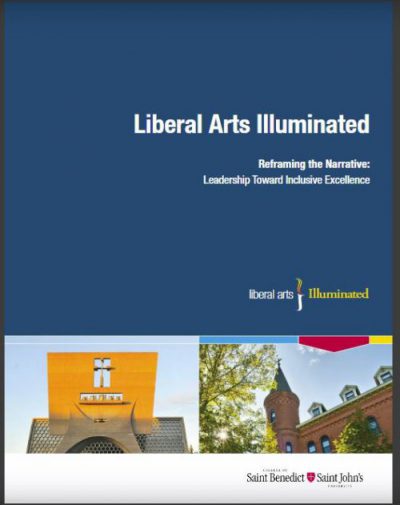Speaking to higher education colleagues convened to discuss the necessity of and means for providing inclusivity as well as excellence in liberal arts education, Jillian Kinzie, NSSE Associate Director and director of the NSSE Institute for Effective Educational Practice, focused on the key roles of learning outcomes assessment and high-impact practices. "One of the things we need to do in this learning and equity paradigm is to be more explicit, much more explicit, about the outcomes we are after in terms of student learning," Kinzie said. "The second is that we need to keep our focus on proven engaging, inclusive, and high-impact practices (HIPs), and enrich our understanding of the extent to which HIPs are experienced by all students, including underrepresented student populations. We also need to help students see the connection between the outcomes expressed in their courses, the curriculum, in their program, and in their co-curricular experiences. Assessment can provide institutions needed information about the alignment between desired learning outcomes and what students are experiencing."
Tia Brown McNair, Vice President in the Office of Diversity, Equity, and Student Success at the Association of American Colleges and Universities, underscored the essential role of data in addressing continuing inequities in liberal arts education: "The reality is that even though we think we're making progress with students of color, specifically with blacks and Latinos in higher education, the gaps are actually getting wider. Institutions need to collect, disaggregate, analyze, and apply data. We have to understand our data if we're going to chart a path forward on what it is we're supposed to be doing."
Liberal Arts Illuminated: Reframing the Narrative Toward Inclusive Excellence, the second annual conference of its kind, held July 9-11, 2018, at the College of Saint Benedict and Saint John's University in central Minnesota, brought together over 150 participants from 18 states--leadership, faculty, and trustees from liberal arts colleges, as well as public policymakers--for a substantive generative conversation about the future of liberal arts institutions with the aim to reframe the current narrative that questions the value of a liberal arts education and higher education in general and to highlight the value of liberal arts in practicing inclusive excellence.
The conference's Workshop 2, Reframing the Narrative: Leadership Toward Positive Outcomes for All Students, was a panel discussion with Jillian Kinzie; Tia Brown McNair; and Noah Silverman, Senior Director of Learning and Partnerships at Interfaith Youth Core. The discussion focused on these questions: What structures, resources, and people do we need in place to ensure the success of all students we serve in our sector? How do we ensure we are not only attentive to the transactional and professional crafting of our students but equally engaged in the transformational work demanded of us as we engage with, and are engaged by, our students? View a video of the session and the session slides.
The downloadable post-conference publication synthesizes the conference content, presents key statistics, highlights models for success, provides questions for educators to bring back to their campuses, and shares ideas for concrete action steps for leadership to reframe the narrative about the liberal arts. This Liberal Arts Illuminated publication highlights NSSE 2017 results from the Inclusiveness and Engagement with Cultural Diversity Topical Module, for example, which found only 50% of students took courses that emphasized learning about other cultures or that discussed issues of equity or privilege. Such findings point to the need to enhance inclusivity in the curriculum and to ensure equity across all colleges and universities. Institutions that participated in the Inclusiveness and Engagement with Cultural Diversity module have the added benefit of assessment results that are specific to their institutional environment, processes and educational activities that reflect cultural diversity and promote greater understanding of societal differences.
View additional comments and contributions related to the conference on Twitter.



